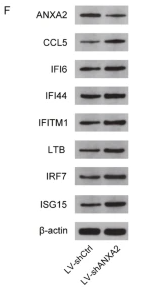IFI6 Antibody - #DF10115
| Product: | IFI6 Antibody |
| Catalog: | DF10115 |
| Description: | Rabbit polyclonal antibody to IFI6 |
| Application: | WB |
| Cited expt.: | WB |
| Reactivity: | Human |
| Mol.Wt.: | 13 kDa; 13kD(Calculated). |
| Uniprot: | P09912 |
| RRID: | AB_2840695 |
Related Downloads
Protocols
Product Info
*The optimal dilutions should be determined by the end user. For optimal experimental results, antibody reuse is not recommended.
*Tips:
WB: For western blot detection of denatured protein samples. IHC: For immunohistochemical detection of paraffin sections (IHC-p) or frozen sections (IHC-f) of tissue samples. IF/ICC: For immunofluorescence detection of cell samples. ELISA(peptide): For ELISA detection of antigenic peptide.
Cite Format: Affinity Biosciences Cat# DF10115, RRID:AB_2840695.
Fold/Unfold
Ifi-6-16; IFI6; IFI6_HUMAN; Interferon alpha-inducible protein 6; Interferon-induced protein 6-16;
Immunogens
A synthesized peptide derived from human IFI6, corresponding to a region within N-terminal amino acids.
- P09912 IFI6_HUMAN:
- Protein BLAST With
- NCBI/
- ExPASy/
- Uniprot
MRQKAVSLFLCYLLLFTCSGVEAGKKKCSESSDSGSGFWKALTFMAVGGGLAVAGLPALGFTGAGIAANSVAASLMSWSAILNGGGVPAGGLVATLQSLGAGGSSVVIGNIGALMGYATHKYLDSEEDEE
Research Backgrounds
Plays a role in apoptosis, negatively regulating the intrinsinc apoptotic signaling pathway and TNFSF10-induced apoptosis. However, it has also been shown to have a pro-apoptotic activity. Has an antiviral activity towards hepatitis C virus/HCV by inhibiting the EGFR signaling pathway, which activation is required for entry of the virus into cells.
Glycosylated.
Mitochondrion inner membrane>Multi-pass membrane protein.
Belongs to the IFI6/IFI27 family.
References
Application: WB Species: Human Sample: HK2 cells
Restrictive clause
Affinity Biosciences tests all products strictly. Citations are provided as a resource for additional applications that have not been validated by Affinity Biosciences. Please choose the appropriate format for each application and consult Materials and Methods sections for additional details about the use of any product in these publications.
For Research Use Only.
Not for use in diagnostic or therapeutic procedures. Not for resale. Not for distribution without written consent. Affinity Biosciences will not be held responsible for patent infringement or other violations that may occur with the use of our products. Affinity Biosciences, Affinity Biosciences Logo and all other trademarks are the property of Affinity Biosciences LTD.
